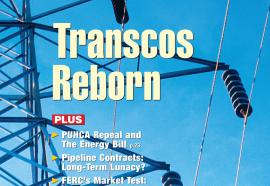Return on Equity: Gen Sector Issues
Ratemaking Special: A survey of recent retail rate cases for electric and gas utilities.
(November 2005) The results of annual survey of rates of return on equity authorized for major electric and natural-gas utilities—based on a sample of the retail rate cases conducted by state public utility commissions—show a vibrant and perhaps growing interest in traditional rate-of-return regulation.








